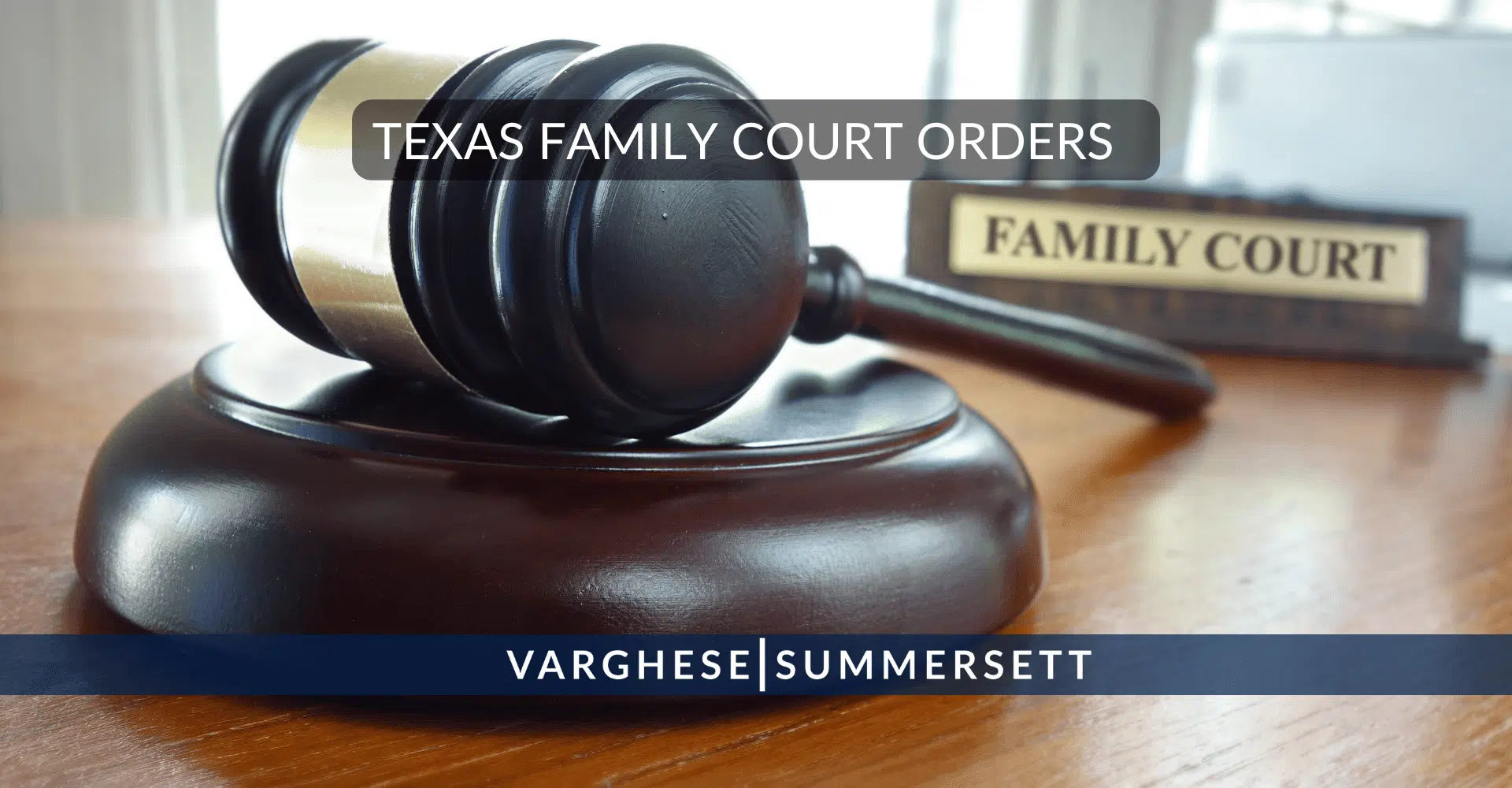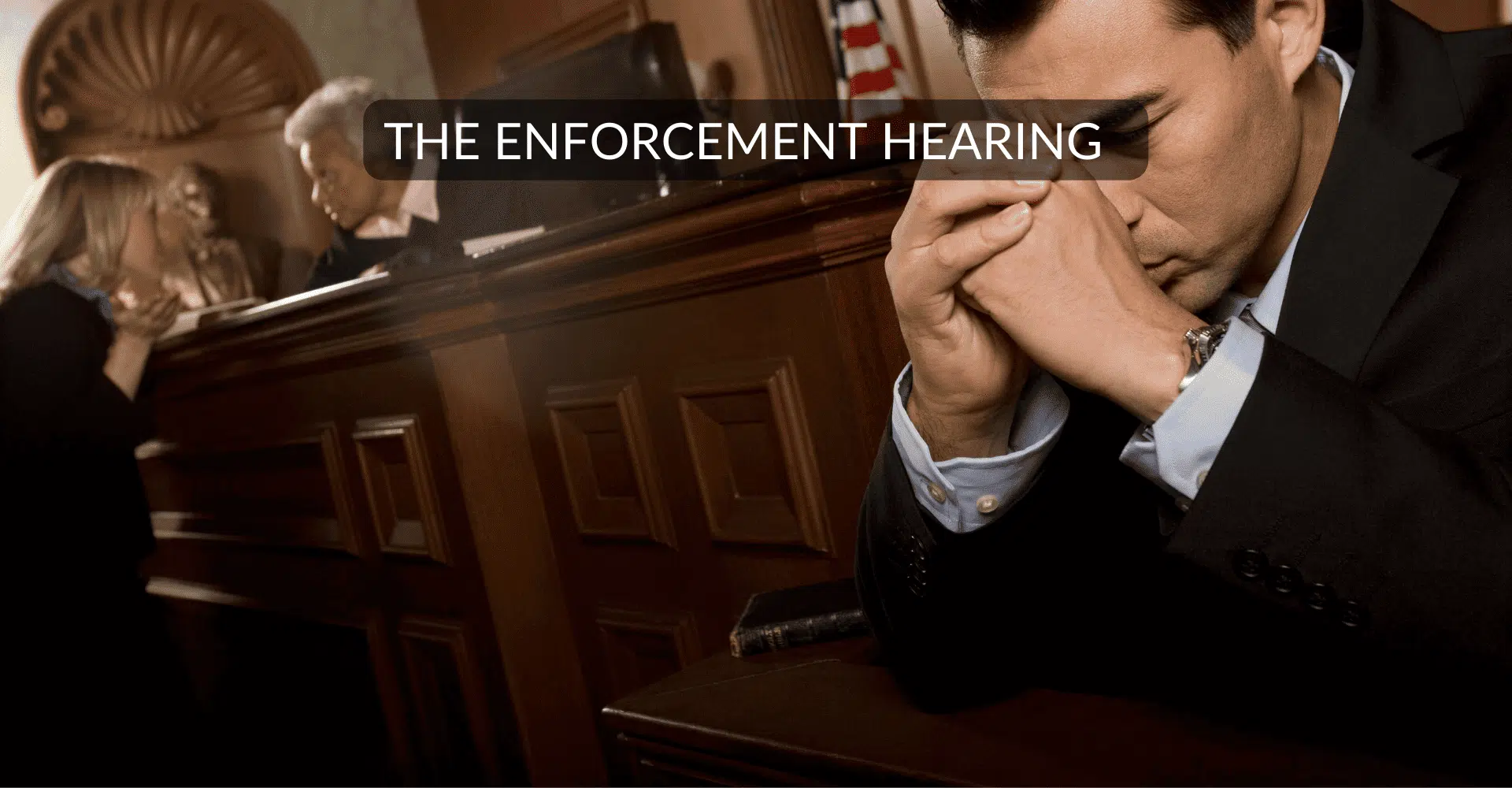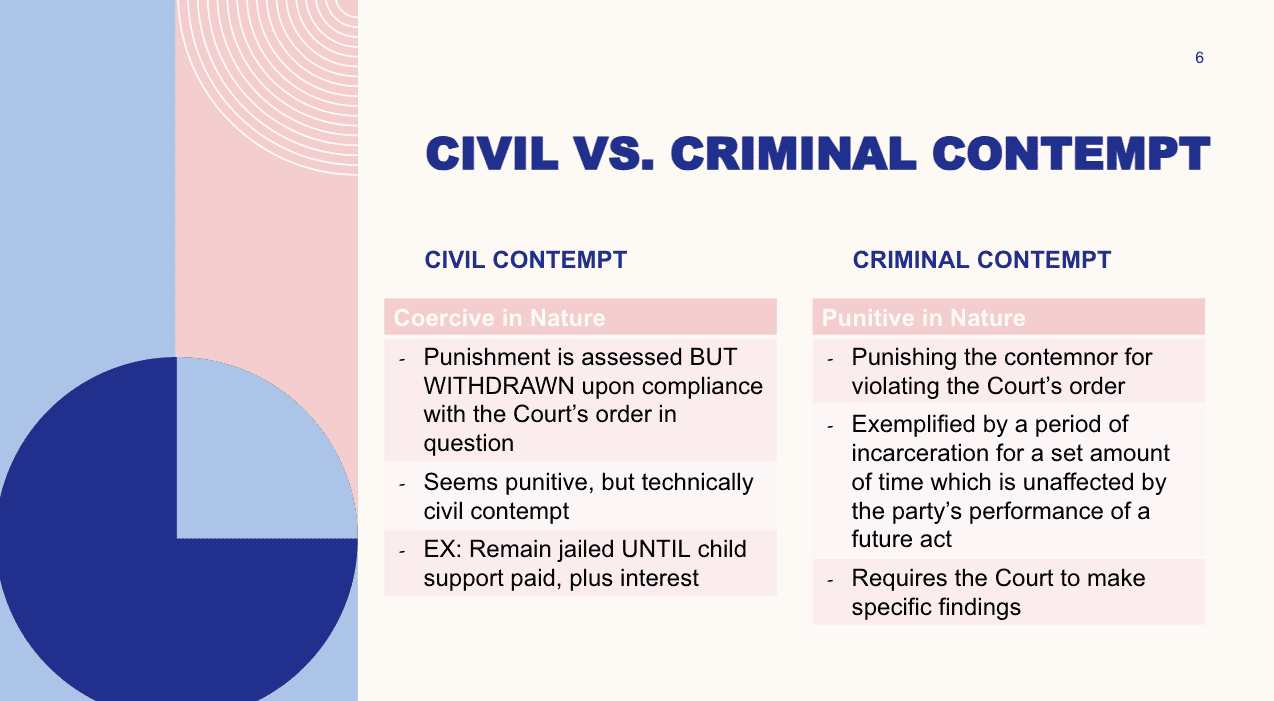
Enforcement of Texas Family Court Orders | Failure to Comply
In Texas, court orders are an essential part of all divorce and family law cases, establishing clear guidelines on child custody, support, and visitation, as well as property division and spousal support. These legally binding documents, issued by the court, are designed to provide a clear path forward for families in transition and minimize potential conflicts in the future.
Court orders take into account the best interests of the children, the financial circumstances of both parties, and a multitude of other factors, ensuring a just and equitable resolution for everyone involved. So, when one of the parties doesn’t follow a court order, it usually doesn’t sit well with the other party – or the judge. They can face serious consequences, including loss of certain rights, fines, or even jail time.
In this article, our experienced family law attorneys explain the enforcement of Texas family court orders, including an overview of common family orders and what can happen when someone doesn’t comply.

Texas Family Court Orders
A court order is an official written directive issued by the court in connection with a family law case. It can be used to resolve both major issues and minor disputes, such as child custody, support, visitation rights, division of assets or debts, property ownership and more. Here’s a quick overview of different types of orders and common examples of non-compliance:
Child Custody and Visitation Orders
These outline where a child will live, visitation schedules for the non-custodial parent, and other custody arrangements.
Example: Sarah was supposed to drop off her son with John, the father, for the weekend as per their custody agreement. However, she decided to take a spontaneous trip out of town instead, preventing John from seeing their son. This denied visitation has occurred on numerous occassions.
Child Support Orders
This details the amount of money a non-custodial parent must provide to support their child or children.
Example: Mike was ordered to pay $800 a month in child support to help Lisa care for their two children. For the past three months, he has not made any payments, leaving Lisa struggling with additional financial burdens.
Alimony or Spousal Maintenance Orders
These indicate whether one party must provide financial support to the other after a divorce and how much money they must pay.
Example: After their divorce, Robert was ordered pay his ex-wife, Michelle, $600 in monthly spousal support. Robert has failed to pay her a penny.
Property Division Orders
These decide how a couple’s assets and debts will be divided following a divorce.
Example: Emma and Lucas had a joint bank account. A court order stated that Lucas was to receive 60 percent of the funds and Emma 40 percnet. Lucas withdrew the entire amount without giving Emma her share.
If your ex-spouse or co-parent has failed to follow the divorce decree or court order, he or she may be subject to legal consequences. It’s important to know that the court has the power to enforce family court orders and take action against those who don’t comply.
What Can I Do if My Ex Refuses to Comply with a Family Court Order?
If your ex-spouse or co-parent has failed to follow the divorce decree or any court order, you have a couple of options:
Try and Resolve the Issue through Communication Or Mediation
Before taking any legal action, it’s often advisable to try to communicate with the other party – either directly or through your attorney. There might be a legitimate reason for the delay or non-compliance. Oftentimes, a stern letter from an attorney is enough to resolve the issue without court intervention. If that doesn’t work, a mediator may be able to help you and the other party come to an agreement.
Pursue Enforcement Action
If communication doesn’t lead to a resolution, the aggrieved party can pursue enforcement action. In Texas, enforcement actions are covered in Chapters 8, 9 and 157 of the Texas Family Code. Chapter 8 addresses spousal maintenance, Chapter 9 addresses property division, and Chapter 157 addresses possession, access, and child support.
Basically, enforcement of Texas family court orders requires filing a lawsuit against the other party for violating a court order. It’s important to contact an experienced family law attorney as soon as possible if you are pursuing enforcement action because the pleadings must be meticulously crafted and accurate.

Pursing Enforcement Action in a Texas Family Law Case
When a party fails to comply with a family court order in Texas, the other party can initiate enforcement proceedings in an effort to gain compliance. Below is an overview of the process:
-
Filing an Enforcement Motion
The first step is to file a motion for enforcement. This document should provide:
- Specific Reference to the Original Order: The pleading should cite the exact provisions of the original order that have been violated.
- Give a Detailed Account of Violations: Describe in detail every instance of the alleged violation, specifying dates, times, and nature of each breach.
- Ask for Relief Sought: Clearly outline the relief or remedy you’re seeking, be it financial compensation, modification of the original order, or other forms of relief.
- Contain Notices: The pleading should also contain necessary notices, such as the respondent’s right to a hearing.
-
Giving Notice to the Non-Compliant Party
Upon filing the motion, the non-compliant party (respondent) must be formally notified. They are served with:
- A copy of the motion for enforcement.
- A citation informing them of the enforcement action.
- Notice of the hearing date.
This ensures that they are aware of the claims against them and have an opportunity to prepare a defense.
-
The Enforcement Hearing
Both parties will attend a court hearing before a family court judge during which the judge will review the pleadings, hear both parties’ testimony and arguments, and render a decision. Here’s an overview of the process:
Commencement
The hearing begins with the court establishing the identities of the parties involved, the nature of the enforcement action, and a brief overview of the original order that is allegedly being violated.
Presentation by the Movant
The party seeking enforcement (movant) presents their case first. Evidence of the violation is provided, which may include documents, witness testimonies, or any other pertinent evidence. The specific clauses or provisions of the original order that have been violated are highlighted.
Respondent’s Defense
The party against whom the enforcement action is taken (respondent) offers their defense. This might include evidence showing compliance, justifying the alleged non-compliance, or challenging the validity of the movant’s claims.]
Witness Testimonies
Witnesses may be called and cross-examined by both parties. These testimonies can provide context, confirm or dispute events, or clarify intentions related to the order’s alleged violation.
Legal Arguments
Attorneys from both sides may present legal arguments, referencing specific laws, past case decisions, or legal interpretations that support their stance.
Court’s Decision
After hearing from both sides, the judge may deliberate on the evidence and arguments presented. The court may seek clarity on specific points or request additional information before making a decision. The judge will then announce the decision. If a violation is determined, the court outlines the appropriate remedies or penalties, which can range from fines to jail time, depending on the nature and severity of the violation. The court can also find that there was no violation and dismiss the motion.
Court’s Order
The court’s decision is documented in a formal order, ensuring both parties understand their responsibilities and any further actions they must take.
Post-Hearing Steps (if necessary)
In cases where the respondent is found in violation and certain penalties or remedies are imposed, they must adhere to the court’s directives. Failure to comply with the enforcement order can result in further legal consequences.
It’s essential to approach an enforcement hearing well-prepared and informed, given the potential legal implications and the impact on all parties involved.
Punishment for Failing to Abide by a Family Law Order
Understanding the repercussions of violating a family court order in Texas is crucial, not just for compliance but also to grasp the gravity of enforcement proceedings. Whether you are the party seeking to enforce an order or the one facing an enforcement action, knowing the range of penalties a judge can impose can prepare you for what lies ahead. Here’s a comprehensive list of punishments that can be meted out following an enforcement hearing.
- Fines: A judge can impose monetary fines on the violating party. The amount varies depending on the nature and severity of the violation.
- Jail Time: For more serious or repeated violations, especially in cases of contempt of court, a judge can sentence the respondent to jail. The duration can vary but often serves as a punitive measure to ensure future compliance.
- Probation: In some instances, the court may choose to place the violator on probation rather than sending them to jail. This often comes with specific conditions that the violator must meet to avoid further penalties.
- Community Service: The court can order the violator to perform a specified number of hours of community service as a form of restitution.
- Suspension of Licenses: For certain violations, like non-payment of child support, the court can order the suspension of professional or driver’s licenses.
- Wage Garnishment: In cases where financial obligations, such as child or spousal support, have not been met, the court can order a portion of the violator’s wages to be directly transferred to the aggrieved party.
- Liens on Property: If the violator owes money, the court can place a lien on their property, ensuring the debt is paid before the property can be sold or refinanced.
- Clarification or Modification of the Order: If the court finds that the original order was ambiguous or needs adjustment due to changed circumstances, it can issue a clarified or modified order.
- Counseling or Educational Programs: For certain types of violations, especially those concerning child custody or visitation disputes, the court may require the parties to attend counseling or parenting classes.
- Attorney’s Fees: The violator may be ordered to pay the attorney’s fees of the party seeking enforcement, especially if the enforcement action is successful.
- Make-up Visitation: In cases where visitation rights were denied, the court might grant additional visitation time to compensate for the lost time.
It’s crucial to understand that the specific punishment handed down depends on various factors, including the nature of the violation, the details of the original order, and any prior history of non-compliance. Violating a family court order in Texas can have significant legal and financial repercussions, and it’s advisable to seek legal guidance if faced with potential enforcement action.
Criminal v. Civil Contempt in Family Law Cases
In Texas family law, the term “contempt of court” refers to the deliberate failure to comply with a court’s order, directive, or decree. This failure not only challenges the authority of the judicial system but can also jeopardize the rights and well-being of involved parties. Within this framework, Texas distinguishes between civil and criminal contempt, each carrying distinct implications, procedures, and consequences. Here’s a look at the difference between the two:
Nature of the Contempt
Civil Contempt: This is used as a coercive measure to ensure future compliance with a court order. The primary aim is to enforce the rights of a private party and compel obedience to a court’s directive.
Criminal Contempt: This is punitive in nature and seeks to punish an individual for an act of disobedience or disrespect that has already occurred, as an affront to the court’s authority.
Purpose of the Contempt
Civil Contempt: The purpose is to benefit the aggrieved party by ensuring compliance. For instance, if one parent refuses to adhere to a custody order, a judge might use civil contempt to ensure future compliance.
Criminal Contempt: The goal is to vindicate the court’s authority and maintain its dignity. It punishes past behavior rather than ensuring future compliance.
Duration of Incarceration (if imposed)
Civil Contempt: The common phrase associated with civil contempt is “the contemnor holds the key to the jailhouse door.” This means that the individual in contempt can secure their release by simply complying with the court’s order. The duration is indefinite but ends once the individual complies or if the underlying order expires.
Criminal Contempt: The punishment is for a specific, fixed period. Once the time is served, the contemnor is released, irrespective of compliance with the initial order.
Right to a Jury Trial
Civil Contempt: Generally, there’s no right to a jury trial in civil contempt proceedings because the aim is remedial, not punitive.
Criminal Contempt: If the potential punishment exceeds a certain threshold (typically six months), the contemnor has the right to a jury trial due to the punitive nature of the proceedings.
In a Texas family law context, both civil and criminal contempt can be powerful tools in enforcing court orders. However, their application, purpose, and procedure differ significantly. If faced with potential contempt proceedings, it’s essential to understand these differences and seek appropriate legal guidance.

The Importance of Perfect Pleadings
In Texas family law, an enforcement order is a directive from the court requiring a party to follow certain stipulations laid out in a prior order, such as a divorce decree or child custody order. To protect and execute these enforcement orders, the associated legal pleadings must be meticulously crafted and accurate. Below we explain why perfect pleadings matter when filing a motion or any legal document related to enforcement of Texas family court orders.
Clear Communication
A well-drafted pleading leaves no room for ambiguity. It precisely communicates the nature of the violation and what the aggrieved party seeks in terms of relief.
Avoidance of Dismissals
Imperfect or incomplete pleadings can lead to the dismissal of enforcement actions. A missed detail or an imprecise description can jeopardize your case.
Efficiency in Proceedings
Precise pleadings streamline court proceedings, as they offer clear guidelines on what is being sought and why.
Upholding the Rights of Both Parties
Accurate pleadings ensure that both parties’ rights are protected, striking a balance between seeking enforcement and safeguarding the respondent’s rights.
Need Help with Enforcement of Texas Family Court Orders? Contact Us.
Enforcement of Texas family court orders can be extremely complex and shouldn’t be handled alone. Whether you are seeking to enforce an order or defending against an enforcement action, it is extremely important to have an experienced family lawyer at your side every step of the way.
Our team is highly skilled in the intricacies of family law enforcement and can help you through what can be a highly emotional process. Contact our office today at 817-900-3220 to discuss your case in further detail.




